无灵主语句
无灵主语句

英语里主语常用人称和非人称两种形式来表达。
用非人称主语表达时,往往注重“什么事发生在什么人身上”。
而汉语则较常用人称主语表达,侧重“什么人怎么样了”。
如1. A terrible thought suddenly struck me—had I locked the door?我突然产生了一个可怕的想法——我锁门了吗?例2.A strange peace came over her when she was alone.她独处时感到一种特别的安宁。
英语中非人称作主语的句子主要有两种类型:a非人称主语句采用“无灵主语”(inanimate subject),表示抽象概念、心理感觉、事物名称或时间地点等,但谓语却常常使用“有灵动词”(animate verb)表示人或社会团体的动作和行为,如:see,desert,find,bring,witness,give,escape,surround,kill,deprive,serve,send,know,tell,permit,invite,take,drive,prevent…from等,这类句子往往带有拟人化(personification)的修辞色彩(如上面两个例句)。
b用非人称代词“it”作主语例如:It never occurred to me that she was so dishonest.译文:我从没有想到她会这样的不诚实。
英语中的这类句子具备着含蓄幽默、生动活泼、客观公正、简洁凝练、句型多样等特点,所以使用广泛。
但是由于汉、英两种语言属于不同的语系,所以在翻译这种无灵主语句时,要考虑到英语的思维方法,然后转换为汉语的思维方法,把句子的内在意义用汉语表达出来。
下面就将非人称(impersonal)主语句英译汉的基本方法略作探讨。
1. 如果主语暗含着条件、因果、时间、地点、方式等意义时,用人作主语,把原来的主语翻译成各种形式的状语。
例如:The forty years, 1840-1880, brought almost ten million migrants to America.译文:从1840至1880这四十年中,近一千万移民移居美国。
无灵主语句
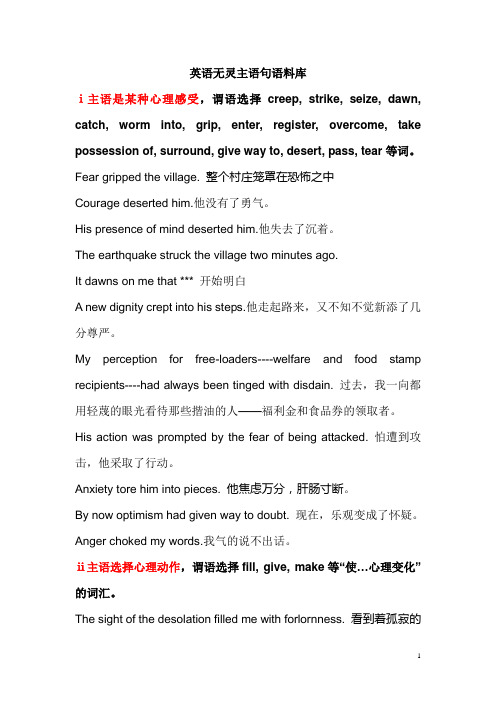
英语无灵主语句语料库ⅰ主语是某种心理感受,谓语选择creep, strike, seize, dawn, catch, worm into, grip, enter, register, overcome, take possession of, surround, give way to, desert, pass, tear等词。
Fear gripped the village. 整个村庄笼罩在恐怖之中Courage deserted him.他没有了勇气。
His presence of mind deserted him.他失去了沉着。
The earthquake struck the village two minutes ago.It dawns on me that *** 开始明白A new dignity crept into his steps.他走起路来,又不知不觉新添了几分尊严。
My perception for free-loaders----welfare and food stamp recipients----had always been tinged with disdain. 过去,我一向都用轻蔑的眼光看待那些揩油的人——福利金和食品券的领取者。
His action was prompted by the fear of being attacked. 怕遭到攻击,他采取了行动。
Anxiety tore him into pieces. 他焦虑万分,肝肠寸断。
By now optimism had given way to doubt. 现在,乐观变成了怀疑。
Anger choked my words.我气的说不出话。
ⅱ主语选择心理动作,谓语选择fill, give, make等“使…心理变化”的词汇。
The sight of the desolation filled me with forlornness. 看到着孤寂的景象,我心中满是凄凉。
无灵主语句

英语里主语常用人称和非人称两种形式来表达。
用非人称主语表达时,往往注重“什么事发生在什么人身上”。
而汉语则较常用人称主语表达,侧重“什么人怎么样了”。
如1. A terrible thought suddenly struck me—had I locked the door?我突然产生了一个可怕的想法——我锁门了吗?例2.A strange peace came over her when she was alone.她独处时感到一种特别的安宁。
英语中非人称作主语的句子主要有两种类型:a非人称主语句采用“无灵主语”(inanimate subject),表示抽象概念、心理感觉、事物名称或时间地点等,但谓语却常常使用“有灵动词”(animate verb)表示人或社会团体的动作和行为,如:see,desert,find,bring,witness,give,escape,surround,kill,deprive,serve,send,know,tell,permit,invite,take,drive,prevent…from等,这类句子往往带有拟人化(personification)的修辞色彩(如上面两个例句)。
b用非人称代词“it”作主语例如:It never occurred to me that she was so dishonest.译文:我从没有想到她会这样的不诚实。
英语中的这类句子具备着含蓄幽默、生动活泼、客观公正、简洁凝练、句型多样等特点,所以使用广泛。
但是由于汉、英两种语言属于不同的语系,所以在翻译这种无灵主语句时,要考虑到英语的思维方法,然后转换为汉语的思维方法,把句子的内在意义用汉语表达出来。
下面就将非人称(impersonal)主语句英译汉的基本方法略作探讨。
1. 如果主语暗含着条件、因果、时间、地点、方式等意义时,用人作主语,把原来的主语翻译成各种形式的状语。
例如:The forty years, 1840-1880, brought almost ten million migrants to America.译文:从1840至1880这四十年中,近一千万移民移居美国。
体现英语思维的句型——无灵主语句
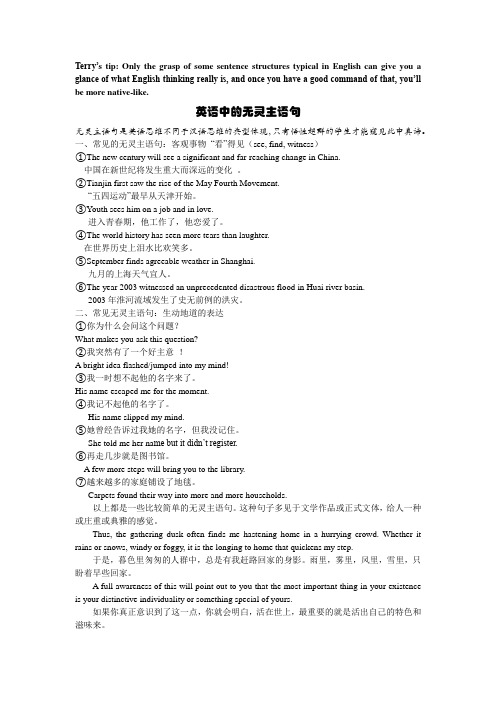
Terry’s tip: Only the grasp of some sentence structures typical in English can give you a glance of what English thinking really is, and once you have a good command of that, you’ll be more native-like.英语中的无灵主语句无灵主语句是英语思维不同于汉语思维的典型体现,只有悟性超群的学生才能窥见此中真谛。
一、常见的无灵主语句:客观事物“看”得见(see, find, witness)①The new century will see a significant and far-reaching change in China.中国在新世纪将发生重大而深远的变化。
②Tianjin first saw the rise of the May Fourth Movement.“五四运动”最早从天津开始。
③Youth sees him on a job and in love.进入青春期,他工作了,他恋爱了。
④The world history has seen more tears than laughter.在世界历史上泪水比欢笑多。
⑤September finds agreeable weather in Shanghai.九月的上海天气宜人。
⑥The year 2003 witnessed an unprecedented disastrous flood in Huai river basin.2003年淮河流域发生了史无前例的洪灾。
二、常见无灵主语句:生动地道的表达①你为什么会问这个问题?What makes you ask this question?②我突然有了一个好主意!A bright idea flashed/jumped into my mind!③我一时想不起他的名字来了。
无灵主语句[整理版]
![无灵主语句[整理版]](https://img.taocdn.com/s3/m/4771b952f08583d049649b6648d7c1c708a10bd8.png)
英语无灵主语句一.主语是情感状态的抽象名词谓语选择如:creep, strike, seize, dawn, catch, worm into, grip, enter, register, overcome, take possession of, surround, give way to, desert, pass, tear 等词。
1. Fear gripped the village. 整个村庄笼罩在恐怖之中。
2. Courage deserted him. 他没有了勇气。
3. His presence of mind deserted him. 他失去了沉着。
4. The earthquake struck the village two minutes ago.5. A new dignity crept into his steps. 他走起路来,不知不觉添了几分尊严。
6. Anxiety tore him into pieces. 他焦虑万分,肝肠寸断。
7. By now optimism had given way to doubt. 现在,乐观变成了怀疑。
8. Anger choked my words. 我气的说不出话。
9. Astonishment deprived me of my power of speech. 我惊讶得说不出话来。
10. Neither sorrow nor regret followed my passionate outburst.我这样发作一通之后,既不难过,也不后悔。
11. A chill of horror suddenly swept over him. 他突然感到不寒而栗。
12. Despair seized him at the thought of her setting out alone to renew theweary quest for work.想起她一个人出去重新登上找工作的艰辛路途,他觉得万念俱灰。
无灵主语句

第二类公式:主语(身体部位/音容笑)+有灵动词+sb
(一)常见此类名词 face/eye/heart/fingers/tears/smile/voice/throat (二)常见有灵动词 fill 充满 stream流淌 interrupt打断linger 继续留存 (tears)spring up =well up 后买你不能直接加人或物 +in one’s eyes (tears) flood/sweep/wash over+sb Tears blurred one’s eyes./one’s eyes got misty ./One’s eyes mistied /dimmed with tears泪眼模糊 tears (roll down one’s eyes/cheeks/face)泪水落下 spread across 浮现 pale 苍白 pierce刺痛 (eyes)brim: v.(使)满,盛满 with tears (eyes) twinkle /sparkle(眼睛因高兴而)发亮;发光;闪耀 (face/eyes) brighten/light up /glow “面露喜色,露出饶有兴趣或喜出望外的神情” “因...颤抖“tremble /shiver/shake (with fear,panic,excitement,rage...)
3. Rome witnessed many great historic events. 罗马发生过许多重大历史事件。
4. The stadium has seen many exciting football matches. 在这体育场里举办过很多精彩的足球赛。
5. The town boasts a beautiful lake. 这个镇引以为荣的是有个美丽的湖。
汉语无灵主语句的理解及其英译

汉语无灵主语句的理解及其英译
汉语无灵主语句是指没有主干动词做主语的句子,没有明确表示出句子主语时,句子主干和句子其他成分有某种关系才能让句子表达意思,故被称为无灵主语句。
无灵主语句可以分为两类:实语无灵主语句和状语无灵主语句。
实语无灵主语句是指在句子中没有主语出现,但宾语是句子的主干,可以将句子的表达意思联系起来的句子。
例如“冬天,穿棉袄”。
在此句中,穿棉袄是句子的主体,宾语,也是动词穿的宾语,因此可以把“穿棉袄”作为句子的主干,用来表达句子的主语,这样就可以把这句话称为实语无灵主语句。
状语无灵主语句是指在句子中没有主语出现,但是状语是句子的主干,可以将句子的表达意思联系起来的句子。
例如“晴天,一起去游泳”,这句话中,晴天是句子的状语,可以将句子的表达意思联系起来,这样就可以把这句话称为状语无灵主语句。
English Translation:
Chinese non-subjective sentences, are sentences without a main verb subject, when there is no clear indication of the subject in the sentence, the main clause and other components must form a certain relationship in order for the sentence to make sense, and thus, it is known as a non-subjective sentence.。
写作微技能——无灵主语的使用

无灵主语的使用
Introduction
无灵主语句: inanimate subject(无灵主语)+animate verb(有灵动词)
无灵主语inanimate subject 物品、动作、情感、时间、地点等
有灵动词animate verb 有生命的事物的动作和行为,如:see、find、bring、
Function:
一、增加主语多样性, 丰富句型
Life has taught me that success is not final. So I always stay humble and never let it go to my head.
二、使语言更生动, 表达丰富,句子瞬间 充满生命力
四、文学作品中给人一 种庄重、典雅的感觉
Thus, the gathering dusk often finds me hastening home in a hurrying crowd. Whether it rains or snows, windy or foggy, it is the longing to home that quickens my step.
give、escape、witness、seize、deny...
汉语常用句子结e subject(有灵主语)+animate verb(有灵动词) I love all my students. (有灵主语 I )
inanimate subject(无灵主语)+animate verb(有灵动词) My love goes to all my students.(无灵主语 love)
The past four years has witnessed an increase in production. ④ At dusk, he was crying in the street. Dusk found him crying in the street. ⑤近十年来,青少年使用社交网站的人数呈爆炸式增长。 The recent decade has witnessed an explosive growth in the number of teenage
高中英语-无灵主语

什么是无灵主语句无灵主语句,是指用无生命的事物做主语,用人或社会团体的行为或动作做谓语,因此这类句子常带有拟人化的修辞色彩。
该句的主语Rome罗马,是无生命的事物,但谓语witness目击,是人的动作。
这种“无灵主语+有灵谓语”的句式,就是无灵主语句。
无灵主语句的亮点在哪?举例对比一下:普通句:She had a good idea.无灵主语句:A good idea came across her mind. / A good idea struck her./ A good idea occurred to her.同样是表达“她有了个好主意”,比起普通句式中的常见句子,无灵主语句中这种拟人化表达,明显更生动、更高级!无灵主语句的分类在读后续写中,无灵主语句的使用主要是有5类。
1. 情感状态的抽象名词+谓语在读后续写中写到人物的情绪或心理时,不要总用sb. feel...,尝试一下无灵主语句。
例如:Fear gripped the village. 整个村庄笼罩在恐怖之中。
Courage deserted him. 他失去了勇气。
Anger choked my words. 我气得说不出话。
A wave of nervousness washed over him. 一阵紧张的情绪涌上他的心头。
A chill of horror suddenly swept over him. 他突然感到不寒而栗。
Excitement seized him. 他好兴奋。
这种拟人化的描写,将情绪生动地表达出来,在考试中绝对加分!补充一些相关常见词汇,大家续写时,可以根据文中的情绪,挑选恰当的词自行搭配。
常见的情绪名词:happiness, joy, delight 开心快乐surprise, astonishment 惊奇,惊讶shame 羞耻,羞愧anger 愤怒despair 绝望regret 遗憾,后悔sorrow 悲伤horror 惊恐anxiety 焦虑disappointment 失望,沮丧satisfaction 满意,满足puzzlement 困惑不解常见的谓语动词:seize 侵袭choke 噎住,堵住flood 充满creep 不知不觉产生grip 紧抓give way to 被……代替wash over 洗涤,侵袭deserted 丢弃,遗弃2. 思考/动作行为的名词+谓语在读后续写中描写人物动作或思考行为时,也可以使用无灵主语句。
英语无灵主语句
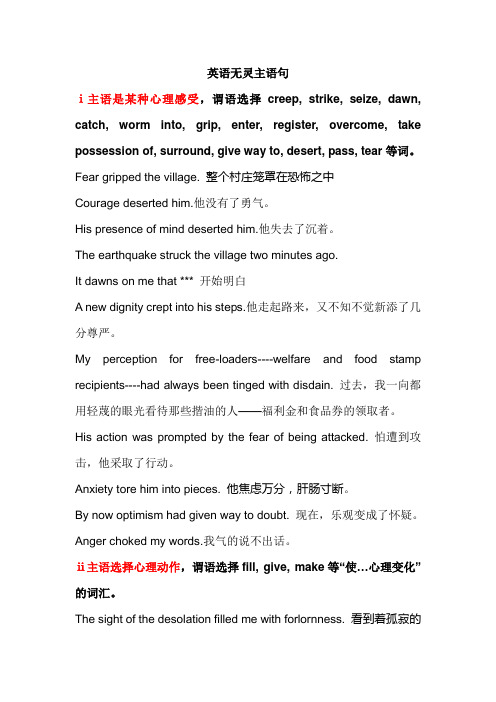
英语无灵主语句ⅰ主语是某种心理感受,谓语选择creep, strike, seize, dawn, catch, worm into, grip, enter, register, overcome, take possession of, surround, give way to, desert, pass, tear等词。
Fear gripped the village. 整个村庄笼罩在恐怖之中Courage deserted him.他没有了勇气。
His presence of mind deserted him.他失去了沉着。
The earthquake struck the village two minutes ago.It dawns on me that *** 开始明白A new dignity crept into his steps.他走起路来,又不知不觉新添了几分尊严。
My perception for free-loaders----welfare and food stamp recipients----had always been tinged with disdain. 过去,我一向都用轻蔑的眼光看待那些揩油的人——福利金和食品券的领取者。
His action was prompted by the fear of being attacked. 怕遭到攻击,他采取了行动。
Anxiety tore him into pieces. 他焦虑万分,肝肠寸断。
By now optimism had given way to doubt. 现在,乐观变成了怀疑。
Anger choked my words.我气的说不出话。
ⅱ主语选择心理动作,谓语选择fill, give, make等“使…心理变化”的词汇。
The sight of the desolation filled me with forlornness. 看到着孤寂的景象,我心中满是凄凉。
高中读后续写情绪描写——无灵主语句

Maruko’s mother felt that a wave of anger swept over her. 小丸子的妈妈感到一阵愤怒。
“无灵”主语句
She was so sad that she burst into crying. She was standing by the door, crying sadly. Suffering and despair defeated her, and she fell sobbing by the door.
>>>Practice makes perfect!
4. 她焦虑不安,在比赛前突然失去了信心。 ______A_n_x_i_e_ty______(主语) tore her into pieces, and before the competition her ____c_o_n_f_i_d_e_n_c_e____(主语) suddenly _________e_s_c_a_p_e_d_/f_a_il_e_d_______(动词) her. 5. 意识到小男孩说了谎时, 她的脸上掠过失望的神情。 When she realized the little boy had lied, ___a_l_o_o_k_o_f_d__is_a_p_p_o_i_n_t_m_e_n_t__(主语) _____c_r_o_s_se_d_/_f_la_s_h_e_d___(动词) her face.
>>>Practice makes perfect! II. 根据 I 中各句进行一对一仿效写句,并背诵。
1. 当老人多年后回到家乡时,激动得热泪盈眶。 When the old man returned to his hometown after so many years, tears of excitement welled up in his eyes. 2. 接着到她表演了,她的心都快跳到嗓子眼儿了。 Then came she to perform, and her heart flew up her mouth. 3. 看着那头发怒的北极熊,我们吓得心脏狂跳,两腿发软。 At the sight of the angry polar bear, we felt so scared that our hearts were pounding and our knees felt weak.
无灵主语句
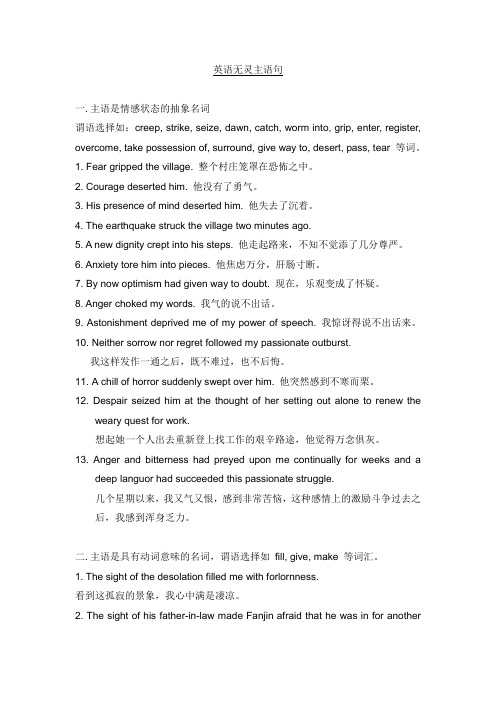
英语无灵主语句一.主语是情感状态的抽象名词谓语选择如:creep, strike, seize, dawn, catch, worm into, grip, enter, register, overcome, take possession of, surround, give way to, desert, pass, tear 等词。
1. Fear gripped the village. 整个村庄笼罩在恐怖之中。
2. Courage deserted him. 他没有了勇气。
3. His presence of mind deserted him. 他失去了沉着。
4. The earthquake struck the village two minutes ago.5. A new dignity crept into his steps. 他走起路来,不知不觉添了几分尊严。
6. Anxiety tore him into pieces. 他焦虑万分,肝肠寸断。
7. By now optimism had given way to doubt. 现在,乐观变成了怀疑。
8. Anger choked my words. 我气的说不出话。
9. Astonishment deprived me of my power of speech. 我惊讶得说不出话来。
10. Neither sorrow nor regret followed my passionate outburst.我这样发作一通之后,既不难过,也不后悔。
11. A chill of horror suddenly swept over him. 他突然感到不寒而栗。
12. Despair seized him at the thought of her setting out alone to renew theweary quest for work.想起她一个人出去重新登上找工作的艰辛路途,他觉得万念俱灰。
体现英语思维的句型——无灵主语句

体现英语思维的句型——无灵主语句Terry’s tip: Only the grasp of some sentence structures typical in English can give you a glance of what English thinking really is, and once you have a good command of that, you’ll be more native-like.英语中的无灵主语句无灵主语句是英语思维不同于汉语思维的典型体现,只有悟性超群的学生才能窥见此中真谛。
一、常见的无灵主语句:客观事物“看”得见(see, find, witness)①The new century will see a significant and far-reaching change in China.中国在新世纪将发生重大而深远的变化。
②Tianjin first saw the rise of the May Fourth Movement.“五四运动”最早从天津开始。
③Youth sees him on a job and in love.进入青春期,他工作了,他恋爱了。
④The world history has seen more tears than laughter.在世界历史上泪水比欢笑多。
⑤September finds agreeable weather in Shanghai.九月的上海天气宜人。
⑥The year 2003 witnessed an unpreceden ted disastrous flood in Huai river basin.2003年淮河流域发生了史无前例的洪灾。
二、常见无灵主语句:生动地道的表达①你为什么会问这个问题?What makes you ask this question?②我突然有了一个好主意!A bright idea flashed/jumped into my mind!③我一时想不起他的名字来了。
高考写作无灵主句知识讲义-高三英语二轮复习

高考英语写作无灵主句一、定义无灵主语就是用无生命的事物作主语。
【例句】1.Shock deprived me of my power of speech.我惊讶得说不出话来2.Horror rulled the whole room.恐惧笼罩了整个房间。
3.The past three years witnessed our growth.过去的三年见证了我们的成长综上例句所述,无灵主句=无灵主语+有灵动词(+宾语)这类动词常用的为:看见see 发现find带来bring见证witness 给予give逃离escape 包围surround剥夺deprive提供serve发送赠送send告诉/见证tell允许permit邀请invite拿/带take驱使drive阻止prevent 等二、分类无灵主语共有四类第一类表示的情感/状态名词作主语例句:1.我紧张得说不出话来。
Tension choked my words.2.我心中充满了喜悦。
A thrill of joy flooded me.3.她失去了勇气。
Courage deserted her .【练习】他惊慌失措。
【答案】Panic seized him表情感/状态的常见名词汇总:开心 delight 激动 thrill放松 relaxation 满意 satisfaction震惊 shock 悲伤sorrow绝望desperation沮丧 frustration愤怒 rage焦虑 anxiety疲惫exhaustion恐惧 fear/horror困惑 confusion羞愧shame尴尬embarrassment孤独loneliness第二类表示思考/动作行为的名词作主语例句:我脑子里闪过一个可怕的念头An awful thought struck me.我们爬了50分钟到了山顶。
A 50 minutes' climbing brought us to the top of the mountain. 【练习】看到这个情景使我心中充满了幸福。
教学总结-读后续写之无灵主语
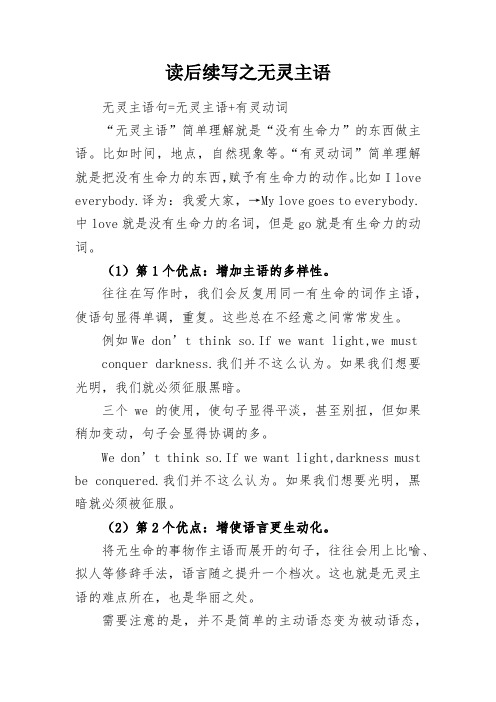
读后续写之无灵主语无灵主语句=无灵主语+有灵动词“无灵主语”简单理解就是“没有生命力”的东西做主语。
比如时间,地点,自然现象等。
“有灵动词”简单理解就是把没有生命力的东西,赋予有生命力的动作。
比如I love everybody.译为:我爱大家,→My love goes to everybody.中love就是没有生命力的名词,但是go就是有生命力的动词。
(1)第1个优点:增加主语的多样性。
往往在写作时,我们会反复用同一有生命的词作主语,使语句显得单调,重复。
这些总在不经意之间常常发生。
例如We don’t think so.If we want light,we mustconquer darkness.我们并不这么认为。
如果我们想要光明,我们就必须征服黑暗。
三个we的使用,使句子显得平淡,甚至别扭,但如果稍加变动,句子会显得协调的多。
We don’t think so.If we want light,darkness must be conquered.我们并不这么认为。
如果我们想要光明,黑暗就必须被征服。
(2)第2个优点:增使语言更生动化。
将无生命的事物作主语而展开的句子,往往会用上比喻、拟人等修辞手法,语言随之提升一个档次。
这也就是无灵主语的难点所在,也是华丽之处。
需要注意的是,并不是简单的主动语态变为被动语态,而是用主动语态去表达被动意义。
比如:I forgot his name.我们忘了他的名字了。
并不是简单地变为His name was forgotten by me.而应当更为形象的用主动语态表示。
比如我们可以说:“他的名字溜出了我的大脑。
”His name slipped my mind.“他的名字没有在我头脑中扎根。
”His name didn't take root in my mind.其实要写这样的句子并不难,只要掌握这种思想,加上一段时间的练习,肯定会下笔如有神。
无灵主语句(写作)
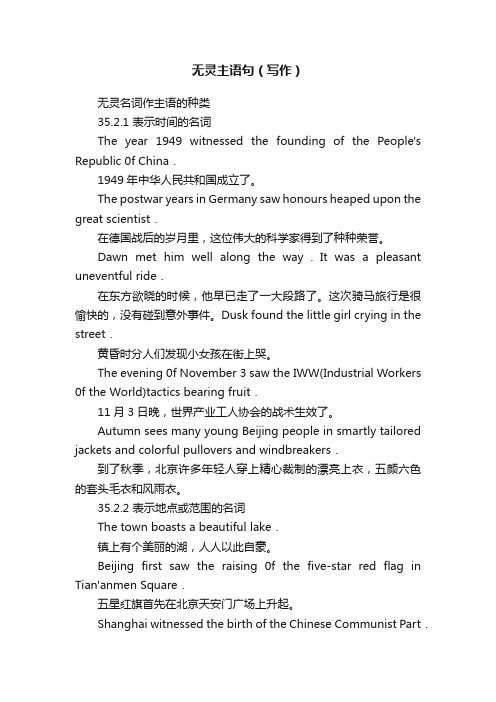
无灵主语句(写作)无灵名词作主语的种类35.2.1 表示时间的名词The year 1949 witnessed the founding of the People's Republic 0f China.1949年中华人民共和国成立了。
The postwar years in Germany saw honours heaped upon the great scientist.在德国战后的岁月里,这位伟大的科学家得到了种种荣誉。
Dawn met him well along the way.It was a pleasant uneventful ride.在东方欲晓的时候,他早已走了一大段路了。
这次骑马旅行是很愉快的,没有碰到意外事件。
Dusk found the little girl crying in the street.黄昏时分人们发现小女孩在街上哭。
The evening 0f November 3 saw the IWW(Industrial Workers 0f the World)tactics bearing fruit.11月3日晚,世界产业工人协会的战术生效了。
Autumn sees many young Beijing people in smartly tailored jackets and colorful pullovers and windbreakers.到了秋季,北京许多年轻人穿上精心裁制的漂亮上衣,五颜六色的套头毛衣和风雨衣。
35.2.2 表示地点或范围的名词The town boasts a beautiful lake.镇上有个美丽的湖,人人以此自豪。
Beijing first saw the raising 0f the five-star red flag in Tian'anmen Square.五星红旗首先在北京天安门广场上升起。
无灵主语句

英语无灵主语句一.主语是情感状态的抽象名词谓语选择如:creep, strike, seize, dawn, catch, worm into, grip, enter, register, overcome, take possession of, surround, give way to, desert, pass, tear 等词。
1. Fear gripped the village. 整个村庄笼罩在恐怖之中。
2. Courage deserted him. 他没有了勇气。
3. His presence of mind deserted him. 他失去了沉着。
4. The earthquake struck the village two minutes ago.5. A new dignity crept into his steps. 他走起路来,不知不觉添了几分尊严。
6. Anxiety tore him into pieces. 他焦虑万分,肝肠寸断。
7. By now optimism had given way to doubt. 现在,乐观变成了怀疑。
8. Anger choked my words. 我气的说不出话。
9. Astonishment deprived me of my power of speech. 我惊讶得说不出话来。
10. Neither sorrow nor regret followed my passionate outburst.我这样发作一通之后,既不难过,也不后悔。
11. A chill of horror suddenly swept over him. 他突然感到不寒而栗。
12. Despair seized him at the thought of her setting out alone to renew theweary quest for work.想起她一个人出去重新登上找工作的艰辛路途,他觉得万念俱灰。
- 1、下载文档前请自行甄别文档内容的完整性,平台不提供额外的编辑、内容补充、找答案等附加服务。
- 2、"仅部分预览"的文档,不可在线预览部分如存在完整性等问题,可反馈申请退款(可完整预览的文档不适用该条件!)。
- 3、如文档侵犯您的权益,请联系客服反馈,我们会尽快为您处理(人工客服工作时间:9:00-18:30)。
敬启者:
现致函贵宾馆为远东公司的三位高层主管约翰逊先生、格林先生和贝克夫人预定以下住宿:10月11号到15号(5晚)带淋浴的单人房三间。
请将三位主管的面包和热饮送至各自房间,如有可能,特别希望能订到俯瞰海德公园的顶层房间。
他们大约会在10月11日晚上7点钟左右抵达饭店。
敬请及早回函确认
敬上
约翰·史密斯Dear Sir,
I’m writing to reserve the following accommodations for three senior executives---Mr. Johnson, Mr. Green and Mrs. Baker---of the Far-East Company: three single rooms with showers for 5 nights from 11th to 15th October. The executives will require continental breakfast served in their rooms and particularly want to be on the top floor overlooking the Hyde Park. We expect them to arrive at the hotel at about 7:00 p.m. Please be so kind as to let us have an early confirmation of this booking.
Yours faithfully,
John Smith
1.到了秋季,北京许多年轻人穿上了精心裁制的衣服。
Autumn sees many young
Beijing people in smartly tailored clothes.
2.镇上有个美丽的湖,人人以此自豪。
The town boasts a beautiful lake.
3.从他的办公室窗口可以看到城镇的全景。
A glance in his office window offers
a panoramic view of the town.
4.我们步行十分钟就到了旅馆。
A ten minute’s walk brought us to the hotel.
5.我完全丧失了勇气。
All my courage deserted me.
6.看到我们的飞机,听到飞机隆隆的声音,令我特别神往。
The sigh and sound
of our jet filled me with special longing.
7.因下雨,我不能来。
The rain prevented me from coming.
8.这个城市刚下过一场大雨。
A heavy rain just visited the city.
9.走在厚厚的地毯上,一点脚步声都没有。
The thick carpet killed the sound of
footsteps.
10.世界上已有不同的现代化道路。
The world has witnessed different roads to
modernization.。
